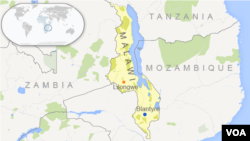Economists in Malawi say the country is likely to continue facing financial challenges in 2015 unless the government can regain the confidence of donors, who are still withholding 40 percent of budgetary support due to the corruption scandal known as Cashgate. More than $30 million were looted from government coffers in the scandal, and several people, including government officials, were arrested.
The withholding of donor aid has forced Malawi's government to pass what is known as the Zero Aid national budget for the 2014-2015 fiscal year. Analysts, such as Abel Mwanyungwe, an economics lecturer at the Polytechnic College of the University of Malawi, say the drop in spending has hurt the economy.
“This has been a bumpy year as we are coming from the Cashgate effects that have quite a major dent on the economy’s performance. We have seen that in most cases the very delicate and crucial departments and service providers have been affected, in the sense that we don’t have enough drugs in the hospitals. In schools, in terms of teachers’ payments is not in time,” said Mwanyungwe.
Mwanyungwe also links Cashgate to the recent depreciation of Malawi’s currency, the kwacha, which has resulted in strikes by various government workers demanding higher pay.
For example, support staff for the judiciary have been on strike for six weeks, seeking a 45 percent pay increase which the government says it cannot afford because it has no money.
Workers at Malawi's Anti-Corruption Bureau went on strike demanding a 70 percent pay raise until the government threatened to forfeit their December salaries if they did not return.
Mwanyungwe said the government can only avoid further strikes in 2015 if it makes efforts to restore donor confidence in the management of its public finances.
“My fear is that if we don’t have this donor confidence and donor support coming back to the economy, we may force the government to go into serious local borrowing that would lead to serious repercussions in terms of inflation, in terms of interest rates and this may have a sort of catch-catch lose situation,” said Mwanyungwe.
The donors are, among other things, demanding that the government prosecute all those involved in the scandal and strengthen its financial management system.
Newton Kambala, the president of the Malawi Confederation of Chambers of Commerce and Industry, said the scandal rendered 2014 as “a very bad year for the business sector, because of huge debts that the government owes the private sector.”
He warned that if the situation persists, “2015 will be worse.”
In his state of the nation address last Saturday, Malawi president Peter Mutharika said his government is doing everything possible to address the problems caused by the Cashgate scandal.
“My government has strengthened the financial system to make sure that Cashgate never occurs again in Malawi. We have resourced fairly well the law enforcement institutions, including the Anti-Corruption Bureau, so that they do a thorough independent job, prosecute all suspects, and recover the stolen resources where possible,” said Mutharika.
Mutharika also said his government is implementing newly-adopted fiscal reforms that seek to grow the country’s economy by 5.5 percent in 2014, up from an estimated 5.0 percent in 2013.




